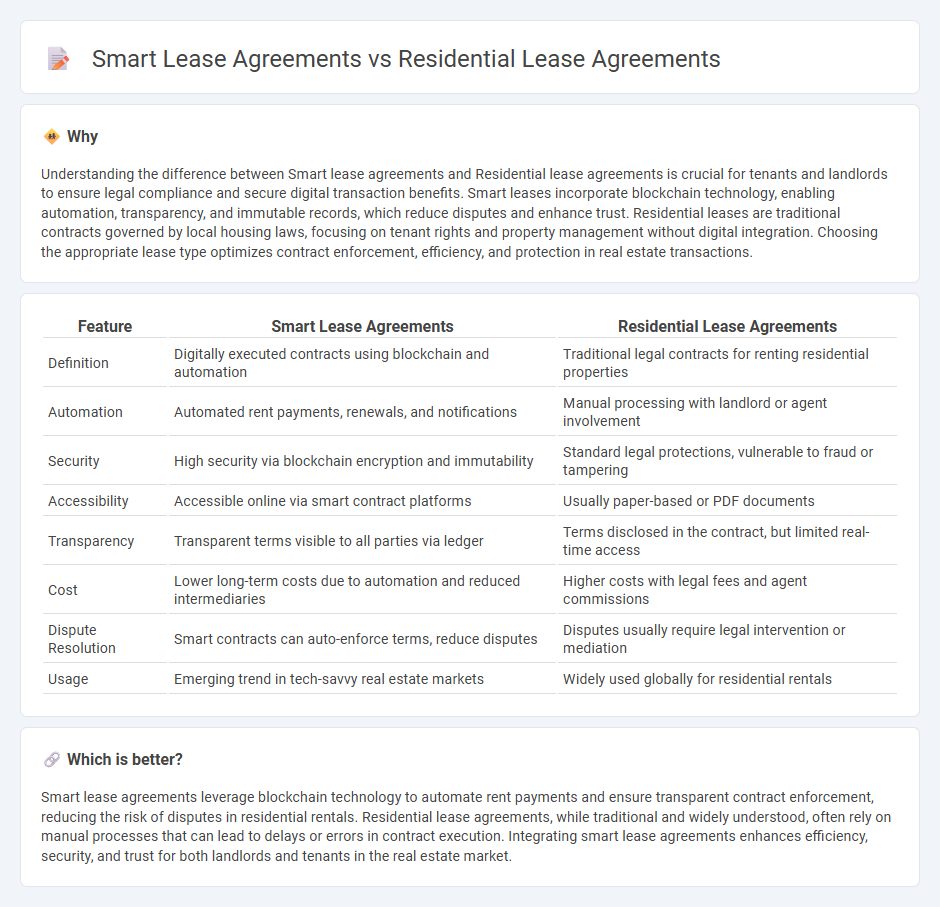
Smart lease agreements leverage blockchain technology and automated contracts to enhance transparency, security, and efficiency in property rentals, reducing fraud and administrative costs. Residential lease agreements are traditional contracts outlining tenant and landlord responsibilities, typically requiring manual updates and physical signatures, which can lead to delays and errors. Explore the key differences and benefits of smart lease agreements to revolutionize your real estate experience.
Why it is important
Understanding the difference between Smart lease agreements and Residential lease agreements is crucial for tenants and landlords to ensure legal compliance and secure digital transaction benefits. Smart leases incorporate blockchain technology, enabling automation, transparency, and immutable records, which reduce disputes and enhance trust. Residential leases are traditional contracts governed by local housing laws, focusing on tenant rights and property management without digital integration. Choosing the appropriate lease type optimizes contract enforcement, efficiency, and protection in real estate transactions.
Comparison Table
| Feature | Smart Lease Agreements | Residential Lease Agreements |
|---|---|---|
| Definition | Digitally executed contracts using blockchain and automation | Traditional legal contracts for renting residential properties |
| Automation | Automated rent payments, renewals, and notifications | Manual processing with landlord or agent involvement |
| Security | High security via blockchain encryption and immutability | Standard legal protections, vulnerable to fraud or tampering |
| Accessibility | Accessible online via smart contract platforms | Usually paper-based or PDF documents |
| Transparency | Transparent terms visible to all parties via ledger | Terms disclosed in the contract, but limited real-time access |
| Cost | Lower long-term costs due to automation and reduced intermediaries | Higher costs with legal fees and agent commissions |
| Dispute Resolution | Smart contracts can auto-enforce terms, reduce disputes | Disputes usually require legal intervention or mediation |
| Usage | Emerging trend in tech-savvy real estate markets | Widely used globally for residential rentals |
Which is better?
Smart lease agreements leverage blockchain technology to automate rent payments and ensure transparent contract enforcement, reducing the risk of disputes in residential rentals. Residential lease agreements, while traditional and widely understood, often rely on manual processes that can lead to delays or errors in contract execution. Integrating smart lease agreements enhances efficiency, security, and trust for both landlords and tenants in the real estate market.
Connection
Smart lease agreements leverage blockchain technology to automate and secure the terms of residential lease agreements, ensuring transparency and reducing the risk of disputes between landlords and tenants. Residential lease agreements benefit from smart contracts by enabling real-time rent payments, maintenance requests, and seamless contract renewals through digital platforms. This integration enhances efficiency, trust, and accountability in property management within the real estate sector.
Key Terms
Rent Payment Terms
Traditional residential lease agreements typically outline fixed rent amounts and due dates, often requiring manual payments via checks or bank transfers. Smart lease agreements leverage blockchain technology and smart contracts to automate rent collection, enforce payment schedules, and reduce the risk of late payments through programmable terms. Explore the advantages of smart lease agreements to understand how they can revolutionize rent payment processes.
Automation/Smart Contract
Smart lease agreements leverage blockchain technology to automate lease execution, rent payments, and maintenance requests through self-executing smart contracts, reducing manual intervention and errors common in traditional residential lease agreements. These automated contracts enhance transparency, security, and efficiency by automatically enforcing terms and recording transactions on an immutable ledger. Explore how smart lease agreements transform property management by increasing operational efficiency and tenant satisfaction.
Maintenance Responsibilities
Residential lease agreements typically allocate maintenance responsibilities clearly between landlords and tenants to prevent disputes, often requiring tenants to handle minor repairs while landlords cover major issues. Smart lease agreements leverage blockchain technology and IoT devices to automate maintenance tracking and notifications, ensuring timely repairs and transparent accountability. Explore how smart leases transform maintenance management for enhanced efficiency and security.
Source and External Links
Residential Lease Agreement Template - Provides a template for outlining the terms of a property rental between a landlord and tenants.
Contractbook: What is a Residential Lease Agreement? - Explains the purpose and advantages of residential lease agreements, including legal protection for both parties.
Free Rental/Lease Agreement Templates - Offers various templates for creating a residential lease agreement, including key features such as term, rent, and dispute resolution.
 dowidth.com
dowidth.com